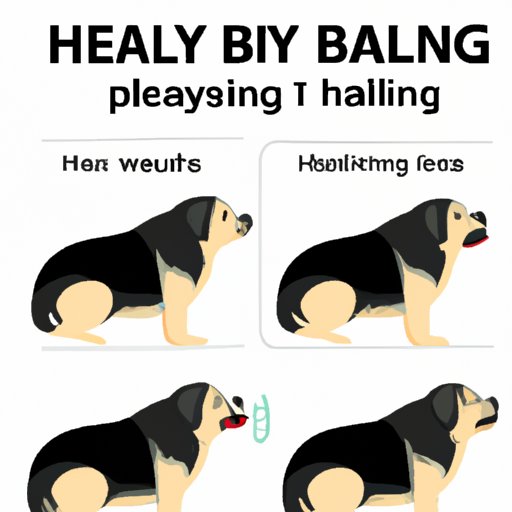I. Introduction
As pet owners, we’re all aware of the importance of keeping a close eye on our furry friends. One thing that can be particularly concerning is heavy breathing in dogs. While panting is a normal way for dogs to regulate their body temperature, there are several other reasons why a dog might be breathing heavily. In this article, we’ll take a closer look at this issue. We’ll explore the potential causes of heavy breathing in dogs, the signs and symptoms to look out for, and how to manage it.
II. Understanding the Causes of Heavy Breathing in Dogs: A Guide for Pet Owners
There are several reasons why a dog might be breathing heavily. Here are some of the most common:
1. Lung problems
Asthma, chronic bronchitis, and other respiratory problems can all cause heavy breathing in dogs. These issues can lead to inflammation, narrowing of the airways, and difficulty breathing.
2. Heart disease
Heart disease is another potential cause of heavy breathing in dogs. This is because the heart is responsible for pumping blood throughout the body, so any issues with the heart can impact blood flow and oxygen delivery to the body.
3. Obesity
Dogs who are overweight or obese are more likely to experience heavy breathing due to the added strain on their respiratory system. This can lead to difficulties breathing, especially during physical activity or periods of exertion.
4. Heatstroke
Dogs can easily become overheated in warm weather, which can lead to heavy breathing. Heatstroke is a serious condition that requires immediate medical attention, so it’s important to keep your dog cool and hydrated during hot weather.
5. Allergies
Allergies can cause inflammation in the airways, leading to heavy breathing and wheezing in dogs. This is more common in dogs with a history of respiratory issues or allergies.
It’s important to identify the cause of your dog’s heavy breathing in order to provide appropriate treatment. If your dog is experiencing heavy breathing, it’s important to seek veterinary attention as soon as possible.
III. Is Your Dog Breathing Heavily? Here’s What You Need to Know
If you notice your dog is breathing heavily, there are several steps you can take:
1. Approach your dog calmly
Approach your dog calmly and gently to avoid causing unnecessary stress. Speak softly and avoid sudden movements.
2. Check their breathing rate
Take note of your dog’s breathing rate and pattern. If your dog’s breathing is fast, irregular, or labored, this could be a sign of a serious issue.
3. Look for signs of distress
Is your dog showing any other signs of distress, such as lethargy, loss of appetite, or coughing? These can all be indicators of a more serious problem.
4. Contact a veterinarian
If you notice any of these warning signs, it’s important to contact your veterinarian. They can help diagnose the issue and provide appropriate treatment.
IV. Signs and Symptoms: When Your Canine Companion is Struggling to Breathe
Here are some of the most common signs of heavy breathing in dogs:
1. Panting
Panting is a natural way for dogs to regulate their temperature, but excessive or heavy panting can be a sign of a more serious issue.
2. Wheezing
Wheezing is a high-pitched whistling sound that can indicate inflammation or an obstruction in the airways.
3. Rapid breathing
Rapid breathing can be a sign of respiratory distress, especially if your dog’s breathing rate is higher than usual.
4. Open-mouth breathing
Open-mouth breathing is another sign of respiratory distress. This is when a dog begins to breathe through their mouth instead of their nose.
If your dog is experiencing any of these symptoms, it’s important to seek veterinary attention as soon as possible. In some cases, these symptoms can indicate a life-threatening emergency.
V. Expert Tips on Managing Heavy Breathing in Dogs
Here are some tips for managing heavy breathing in dogs:
1. Avoiding triggers
If your dog’s heavy breathing is caused by allergies or other triggers, it’s important to avoid these triggers as much as possible.
2. Keeping your dog cool
If your dog is overheated, provide them with cool, fresh water and a cool, shady place to rest.
3. Offering small, frequent meals
Feeding your dog small, frequent meals can help reduce strain on their respiratory system and improve overall health.
The specific treatment for your dog’s heavy breathing will depend on the underlying cause, so it’s important to work closely with your veterinarian to create an appropriate treatment plan.
VI. The Importance of Recognizing Heavy Breathing in Your Furry Friend
Ignoring heavy breathing in dogs can have serious consequences. If left untreated, it can lead to respiratory failure, heart failure, and even death in severe cases.
Regular veterinary check-ups can help identify any potential issues before they become more serious. It’s important to take your dog to the vet at least once a year for routine check-ups, and more frequently if they’re experiencing any health issues.
VII. A Personal Account: How I Helped My Dog Overcome Heavy Breathing
As a dog owner, I’ve experienced heavy breathing in my own furry friend. My dog was diagnosed with asthma, and it was a scary experience for both of us. However, with the help of our veterinarian, we were able to create a treatment plan that helped manage his symptoms.
If your dog is experiencing heavy breathing, remember that you’re not alone. Work closely with your veterinarian to create an appropriate treatment plan, and don’t hesitate to reach out for support if you need it.
VIII. Conclusion
Heavy breathing in dogs can be a sign of a serious issue, so it’s important to seek veterinary attention as soon as possible if you notice any warning signs. By understanding the potential causes, signs and symptoms, and management options, you can help keep your furry friend happy and healthy for years to come.
Remember, your veterinarian is your best resource for information and support.
